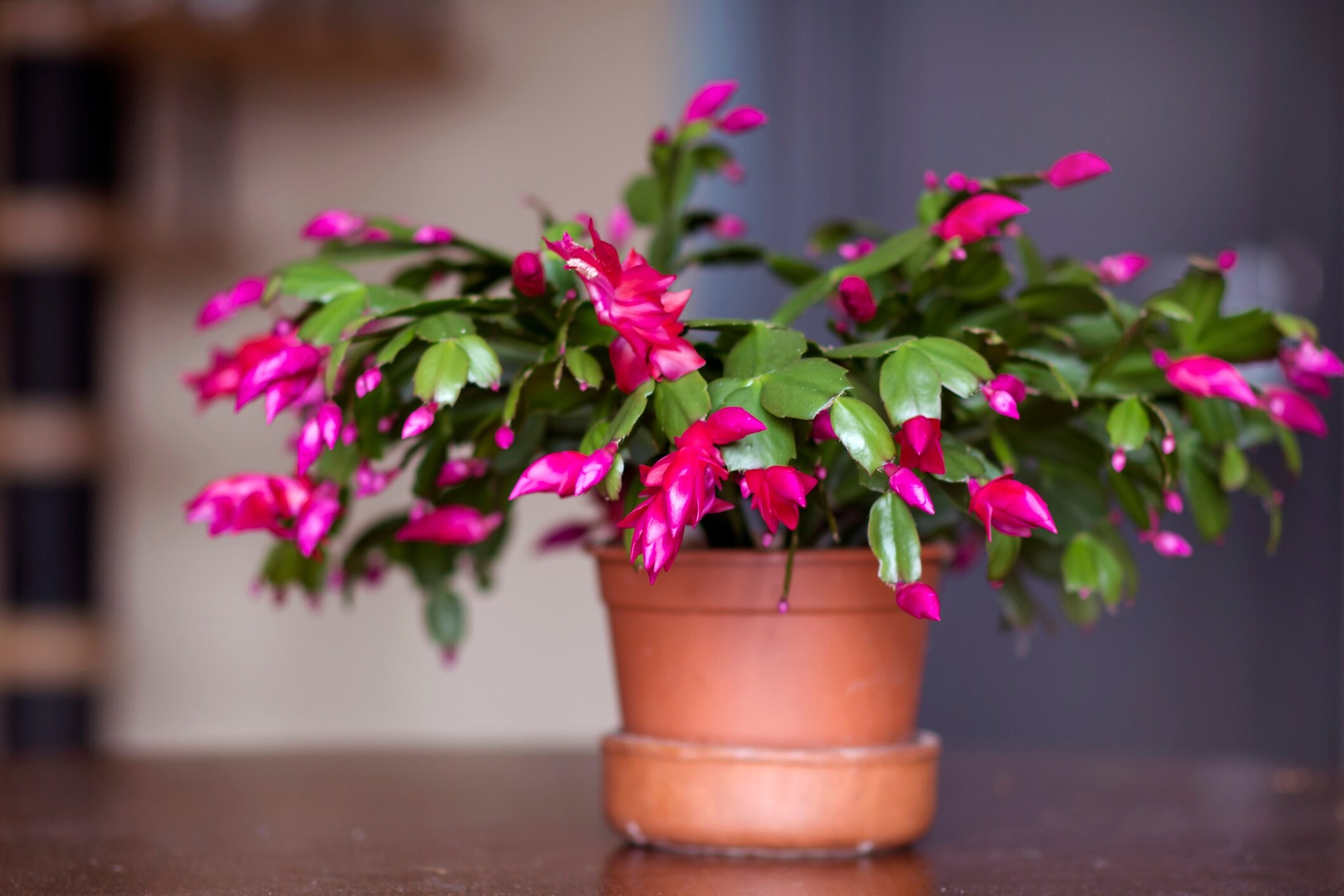The holiday season is a magical time, filled with festive decorations and beloved traditions that bring warmth to our homes. Among these traditions, decorating with seasonal plants is a popular way to embrace the holiday spirit. The Christmas cactus (Schlumbergera bridgesii) stands out as a favorite, adding a touch of natural beauty to our homes during this special time of year.
 Christmas cactus in a terracotta pot, showcasing its vibrant green segmented stems, highlighting the non-toxic nature of Christmas cacti for pets when displayed as indoor holiday decor.
Christmas cactus in a terracotta pot, showcasing its vibrant green segmented stems, highlighting the non-toxic nature of Christmas cacti for pets when displayed as indoor holiday decor.
Known for its distinctive segmented stems, delicately serrated edges, and brilliant blooms in a spectrum of colors from red and pink to orange, purple, and white, the Christmas cactus typically graces us with its flowers in December in the Northern Hemisphere, perfectly aligning with the holiday season.
Other holiday-themed succulents, such as the Thanksgiving cactus and Easter cactus, also contribute to the festive cheer. Originating from the humid rainforests of Brazil, these plants are well-suited as houseplants, bringing a tropical element to our indoor spaces. It’s natural for our curious pets, especially cats and dogs, to be intrigued by these new green additions to their environment.
For pet owners, particularly those with inquisitive cats, it’s essential to be aware of any potential hazards these plants might pose if your furry companions decide to explore them with their mouths. Understanding the toxicity of holiday plants is crucial for ensuring a safe and happy holiday season for everyone in your household.
Understanding Christmas Cactus and Pet Safety
The good news for pet lovers is that the Christmas cactus is considered to have low toxicity for pets, including both cats and dogs. This means that unlike some other holiday plants, it is not poisonous in the true sense of causing severe or life-threatening reactions. However, “non-toxic” doesn’t mean “consequence-free.” While Christmas cactus is not deadly, it can still lead to some unpleasant digestive issues if ingested by your pet.
If a cat or dog decides to chew on or eat parts of a Christmas cactus, the primary concern stems from the plant’s fibrous nature. This fibrous material can irritate your pet’s mouth, throat, and the lining of their stomach. This irritation can manifest in a range of gastrointestinal symptoms, varying in severity depending on how much of the plant is consumed.
Common symptoms to watch out for if your pet has nibbled on a Christmas cactus include:
- Vomiting: This is a common reaction as the body tries to expel the irritating plant material.
- Diarrhea: Digestive upset can lead to loose stools.
- Reduced Appetite: Your pet might show less interest in food due to nausea or stomach discomfort.
- Lethargy: Feeling unwell can cause your pet to become tired and less energetic than usual.
In more severe cases, especially if a larger quantity of the Christmas cactus is ingested, there’s a potential risk of gastrointestinal blockage. This occurs when the ingested plant material obstructs the stomach or intestines, preventing the normal passage of food and liquids. Vomiting is often an early sign of a blockage as the body attempts to remove the obstruction.
Fortunately, unlike true cacti from arid regions, the Christmas cactus does not have sharp spines. This eliminates the risk of physical injury from spines if your pet brushes against or takes a small taste of the plant. The main concern remains digestive irritation and potential blockage from consuming a significant amount.
Recognizing Symptoms of Christmas Cactus Ingestion in Pets
If you suspect your cat or dog has indulged in a Christmas cactus snack, vigilance is key. Keep a close watch for the following symptoms that may indicate your pet is experiencing discomfort due to plant ingestion:
- Vomiting: A primary indicator of gastrointestinal distress or potential blockage.
- Diarrhea: Signifying irritation within the digestive tract.
- Lethargy: Unusual tiredness or sluggishness suggesting your pet is not feeling well.
- Decreased Appetite: Refusal to eat or reduced food intake due to nausea or stomach upset.
- Nausea: Signs such as excessive drooling, lip licking, or restlessness can point to nausea.
These symptoms can appear relatively quickly, often within a few hours after ingestion. If your pet has only consumed a tiny amount, the symptoms might be mild and resolve on their own without intervention. However, if a larger portion of the plant was eaten, or if your pet is particularly small or sensitive, the symptoms could be more pronounced and require attention.
What to Do If Your Pet Eats Christmas Cactus
If you discover that your cat or dog has eaten part of your Christmas cactus, prompt action is the best course of care. While Christmas cactus is not highly toxic, it’s always wise to seek professional advice to ensure your pet’s well-being.
Your first step should be to contact your veterinarian. They are best equipped to assess the situation based on your pet’s size, health history, and the amount of plant ingested. If your vet’s office is closed, or you prefer an immediate consultation, you can reach out to the Pet Poison Helpline® or the ASPCA Animal Poison Control Center. These hotlines provide 24/7 access to veterinary toxicology experts who can offer guidance based on the specific circumstances.
Important Note: Do not attempt to induce vomiting in your pet at home unless explicitly instructed to do so by a veterinarian or a poison control expert. Inducing vomiting incorrectly can sometimes cause more harm than good.
Depending on the amount ingested and the symptoms your pet is exhibiting, the veterinary professional may advise you to monitor your pet closely at home. In this case, carefully observe for any signs of worsening stomach upset or potential blockage, particularly persistent vomiting. Vomiting can be a critical indicator of a blockage and warrants immediate veterinary attention.
Even if your pet initially appears fine, symptoms can sometimes develop later. Therefore, it’s crucial to remain vigilant and monitor your pet closely for the duration recommended by your veterinarian or the poison control helpline.
Potential Outcomes and Veterinary Care
The advice you receive from a veterinary professional will guide whether home monitoring is sufficient or if a veterinary visit is necessary. Minor ingestion might only require observation, while larger quantities or the presence of concerning symptoms may necessitate a trip to the vet.
For cases where a significant amount of Christmas cactus has been consumed, or if your pet is showing troubling symptoms, your veterinarian can provide treatments to alleviate discomfort. These treatments might include anti-nausea medications to settle the stomach or intravenous fluids to combat dehydration if vomiting and diarrhea are severe.
In situations where a blockage is suspected, diagnostic imaging such as X-rays may be needed to confirm the obstruction caused by plant material. Fortunately, with timely veterinary care, most pets who ingest Christmas cactus recover fully without lasting effects. Some pets might require a few days of medication to soothe their digestive system, but many bounce back to their normal selves quickly, often on their own.
Other Holiday Plants to Keep Away From Pets
While the Christmas cactus is relatively low-risk, many other popular holiday plants are significantly more toxic to pets. It’s crucial to be aware of these potential dangers to create a truly pet-safe holiday environment. Here are some holiday plants that pose a greater risk to cats and dogs:
- Lilies: Lilies are extremely dangerous, especially for cats. Even small ingestions of lily pollen, petals, or leaves can cause severe kidney failure in cats, often starting with vomiting and lethargy.
- Christmas Trees (Fir Trees): While not highly toxic, the oils from fir trees can irritate your pet’s mouth and stomach, leading to drooling and digestive upset. Additionally, tree needles can be sharp and cause obstructions if swallowed.
- Mistletoe: Ingestion of mistletoe can result in drooling, vomiting, and diarrhea. Larger amounts can have more serious effects, impacting the heart and nervous system.
- Holly: Holly berries and leaves contain toxins that can cause stomach upset even in small amounts. Larger ingestions can lead to significant digestive distress and, in rare cases, neurological issues like wobbly gait.
- Amaryllis: Amaryllis bulbs and plants can cause vomiting, diarrhea, and abdominal pain. The bulb is particularly potent and can lead to low blood pressure and seizures if consumed in large quantities.
- Poinsettia: Often mistakenly believed to be highly toxic, poinsettias generally cause only mild to moderate stomach upset in pets.
Creating a Pet-Safe Holiday Environment
To ensure a safe and joyful holiday season for your furry family members, proactive measures are essential. While the Christmas cactus poses a minimal threat, the presence of other, more toxic holiday plants necessitates careful planning.
One of the most effective strategies is to place plants completely out of your pet’s reach. This might involve using high shelves, hanging planters, or rooms that are inaccessible to your pets. Alternatively, consider opting for pet-friendly holiday decorations. There are many beautiful and festive decorations that do not involve plants and are entirely safe for pets.
For ground-level plants, using pet gates to restrict access to rooms where these plants are located can be a helpful solution. This is particularly useful for keeping curious cats away from potentially harmful plants.
If you are ever uncertain about the safety of a specific plant, a quick call to your veterinarian or the Pet Poison Helpline can provide the clarity and guidance you need.
By staying informed about potential plant hazards and being attentive to any signs of ingestion, you can ensure a happy, healthy, and safe holiday season for both you and your beloved pets.
WRITTEN BY
Pet Poison Helpline Veterinarian Team
Veterinarian
Pet Poison Helpline®, your trusted resource for toxicology expertise and pet health advice during potential emergencies, is available 24/7…
